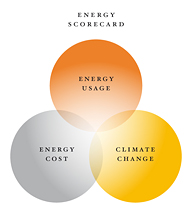
Energy optimisation—the hottest topic right now
Energy issues are a hot topic right now, and this isn’t surprising, they’re a segment where there’s a lot to do. Overhauling and working actively on rationalizing and optimising energy consumption is becoming increasingly common. And the gains are substantial—for the environment and the economy.
This encapsulates how Mikael Olsson, a Service Developer at Coor who works in the energy segment, views these issues. Mikael has spent several years as an energy consultant for a range of large corporations, and as he sees it, his interest in energy issues is growing day by day. The explanation lies partly in growing knowledge of the energy sector, but also a sharper environmental focus and rising energy prices.
“Obviously, you can’t argue with actual cash sums. And in fact, there’s much more to gain here than you might think. My experience is that expert skills and continuity are what you need to achieve the best results. Gävle Hospital is a really topical example, where we’ve fine-tuned existing equipment to make yearly savings of some SEK 1.7 m for Gävleborg County Council, without them requiring any investment. These are actual numbers, which we can verify statistically through energy consumption,” says Mikael.
The gains are actually greater than this—an active approach to saving energy also produces environmental gains, which create a lot of goodwill nowadays, with the climate issue. Currently, customers and prospective employees are being very demanding about their suppliers’ or employers’ environmental awareness.
The right skills—close to the customer
Coor has long-term experience and substantial skills in the energy segment. Coor’s energy services are divided into three main segments: energy declaration, energy control and energy rationalization. The largest, and arguably most important, is energy control, which is about continually overhauling and fine-tuning technical plant to minimise energy consumption. To safeguard effective and balanced energy work, Coor has developed a balanced energy control concept: the ‘energy control card’, which itself, covers three key segments—climate change, energy cost and energy use.
 So Coor has good accountability for energy matters, it has chosen to locate its resources locally on a specific contract or business area. The advantage is that expert skills are associated with the customer in a different way than is customary in the sector, where energy engineers are often stationed centrally, serving several customers. Coor’s approach gives customers direct contact with their engineers and technicians.
So Coor has good accountability for energy matters, it has chosen to locate its resources locally on a specific contract or business area. The advantage is that expert skills are associated with the customer in a different way than is customary in the sector, where energy engineers are often stationed centrally, serving several customers. Coor’s approach gives customers direct contact with their engineers and technicians.
Coors branded energy control card is a balanced energy control concept.
“We’re convinced that our working method offers the greatest benefit for our customers, because they get the skills they need. To ensure the dissemination of good ideas and exchange of best practice and skills throughout Coor, we work actively using a group-wide energy network. The network meets regularly, and its members maintain extensive contact with each other between meetings,” notes Mikael.
Hottest right now—energy optimisation
Energy optimisation is Coor’s most in-demand energy service right now, and is an important component of energy control. But what do customers actually want help with? In concrete terms, what does Coor do in energy optimisation?
Mikael says the first task is to gain a clear view of current status and to define areas of development. These are then presented to, and discussed with, the customer, which often (but not always) results in over-arching energy targets. This is followed by the important work on progressively modifying systems and plant so energy consumption is optimised and the set goals are achieved. Coor has developed effective tools like check-lists, templates and process definitions for this work. An energy monitoring/analysis system database (WebEss) is used to support this work group-wide.
“When we take on responsibility for technical management, we are in a good position to help our customers reduce their energy costs. You can operate plant in different ways and with different energy consumption. A lot of people also forget that energy optimisation is a constant process. Technical systems need constant adjustment to match changes in operations: take a simple example like operating times on ventilation systems, which should be continually fine-tuned to match their actual usage in premises. It’s important to maintain constant interaction with the operational changes and relocations occurring in an organisation,” continues Michael.
Implementing small but important measures, like changing light bulbs in offices or replacing circuit-breakers with movement sensors in common areas, is another important part of this work.
“There’s also much to gain from training and getting commitment from employees within an organisation, thus trying to change behaviour and habits. It’s important to be aware of your power consumption in everyday situations, and to remember to shut down your PC when you leave work, or turn off conference room lights when you leave. Simple technology solutions and ongoing training can also produce good results here.”
“Energy optimisation work is really fun and rewarding. It’s a segment where you discover new opportunities and potential all the time. And it feels great to work for a good purpose—the kilowatt hour we save is the best environmental saving,” ends Mikael.
To find out more:
Contact Mikael Olsson, Services Developer at Coor in energy, mikael.olsson@coor.com or phone: +46 (0)8 553 95937
* Coor’s energy competences
Coor possesses broad-based and in-depth competencies in the energy segment. The major energy services Coor offers are:
- Energy control
Energy control has services such as monitoring energy consumption, energy optimisation, monitoring energy costs, subscription optimisation, energy tax optimisation, optimising energy pricing, monitoring climate impact and optimising energy sources. - Energy rationalization
- Energy declarations
